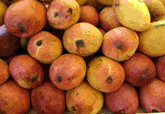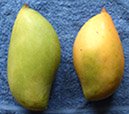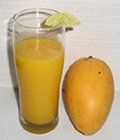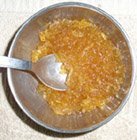Selection and storage
Mangos are seasonal produce; fresh mango fruit season begins by March-end when its rich fragrance heralds its arrival in the markets.
Mangoes are normally harvested while they are green but perfectly matured on the tree. Unripe fruits are extremely sour. Organic mangoes are left to ripen on the tree; however, fully ripe fruits fall off the tree and tend to get spoiled.
 |
 |
| Sindhuri (kesar) mangos | “Totapuri” variety mangos. |
In the store, mangoes come in various sizes, shapes, and colors. Select the one based on the serving size and variety of fruit you love to devour.
“Alphonso” variety from India (Maharashtra state), and “sindhuri” (kesar) varieties from Pakistan are known for their uniqueness. Totapuri mangoes feature parrot-beak like
tips, and smooth shiny skin and come in attractive green-yellow or orange colors.
Choose ones with intact skin without any bruises or cuts. Unripe mangoes can be kept at room temperature for a few days, and to ripen, keep them in paper covers. Ripe fruits should be stored in the refrigerator but never below 10° F (50°C). Bring back to normal temperature when the fruit is to be eaten to get the natural taste and flavor.
Preparation and serving method
Wash mangoes in cold running water in order to remove dust/dirt and any surface chemical residue. Mop dry its outer skin using a soft cloth. Mango fruit should be eaten all alone without any seasonings/additions to experience its rich flavor.
Cut the fruit lengthwise into three pieces in such a way that the middle portion consists of a husky seed. Then, slice through the skin to separate the skin from the pulp. Chop pulp into desired sections.
Alternatively, using a sharp knife, cut through the flesh on either side of the central seed (stone). This way, you get two big halves of mango fruit and a central stone portion. Then, take one-half and score the flesh in a horizontal and vertical pattern taking care not to cut deep through the skin. Invert the whole half to push
out the cubes as shown in the picture below:

|
Here are some serving tips:
 |
 |
| Delicious mango juice! | Green mango marmalade. |
- Mango fruit can be enjoyed all alone without any seasonings/additions.
-
Fresh mango cubes are a great addition to fruit salsa and salads.
-
Mango juice with ice cubes is a popular, delicious drink.
-
Mango fruit juice blended with milk as a “mango milkshake.” Mango fruit is also used to prepare jam, jelly, ice cream, and in sweet-candy industries.
-
Unripe, raw, green mango has been in use in the preparation of pickles, jam (marmalade), and chutney in the Asian countries.
Safety profile
Mango fruit should be avoided in the diet of individuals on warfarin therapy. Mangoes, being high in vitamin A, could result in
potentiation of warfarin activity that may cause increased bleeding risk. (Reference link-Food and lifestyle interactions with Warfarin).
Mango latex allergy, especially with raw, unripe mangoes is common in some sensitized individuals. Immediate reactions may include
itchiness at the angle of the mouth, lips, and tip of the tongue. In some people, the reactions can be severe, with manifestations like
swelling of the lips, ulceration at the mouth angles, respiratory difficulty, vomiting, and diarrhea.
This reaction develops because of the anacardic acid present in raw, unripe mangoes. Cross-allergic reactions with other Anacardiaceae
family fruits like “cashew apples” are quite common. Such events may be a rarity with completely ripe fruits; however, people with known cases of mango fruit allergy may want to avoid eating them.
(Medical disclaimer).
Facts qoute
Mango fruit is an excellent source of vitamin A, carotene pigments, vitamins, and potassium.
Mango fruit should be avoided in the diet of individuals on warfarin therapy. Allergic manifestations after eating raw unripe mango is common.
≻≻-Back to Fruits from Mango fruit. Visit here for an impressive list of all varieties of fruits with complete illustrations of
their nutrition facts and health benefits.
≻≻-Back to Home page.
Further Resources:
-
Mangifera indica-Agroforestry Net.
-
USDA – Nutrient Database for Standard Reference.
-
All about mangoes-National Mango Board.
-
Food and lifestyle interactions with Warfarin.













